#italian idiom
Text
Mussels in Italian Language and Culture
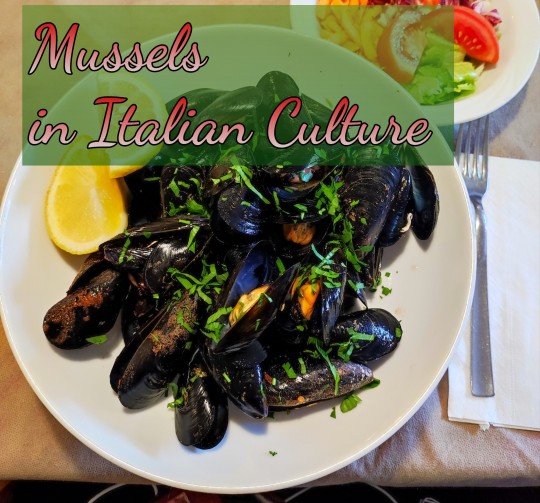
La cozza (pl. le cozze)= mussel(s)
This is one of those instances, in which dialect terms take over the national language.
The word "cozze" belongs, in fact, to Southern Italian dialects, but it is so widely used that Italians think it's actually Standard Italian.
As a matter of fact, the proper Italian term is MITILI (MEDITERRANEI), but nobody really uses it.
Other terms used in the various regional dialects:
PEOCI in Veneto;
MOSCIOLI in the Marche region;
MUSCOLI in Liguria and in the Northern area of Tuscany. It derives from the Latin "musculus", from which originated also the German term "Muscheln", the English "mussels", the French "moules", etc.
IDIOMS RELATED TO COZZE:
"essere una cozza" (Lit. "To be a mussel"): offensive way to address a woman to say she's ugly;
"Attaccarsi come una cozza (allo scoglio)" [lit. "To cling as a mussel (to the rock)]: meaning to be extremely clingy.
COZZE AS FOOD
There's an Italian saying stating that mussels are good only "in the months without the R" (meaning gennaio, maggio, giugno, luglio, agosto).
MUSSELS-BASED DISHES TO TRY WHILE IN ITALY
Impepata di cozze (peppered mussels/steamed mussels with pepper): appetizer typical of Naples and Sicily;
Cozze gratinate (mussels au gratin): appetizer;
Cozze fritte (fried mussels): appetizer typical of the Apulia region;
Spaghetti with mussels: first course.
-
Sara - Unearth Italy. Find me on WordPress and Instagram.
14 notes
·
View notes
Text
misogyny in linguistics
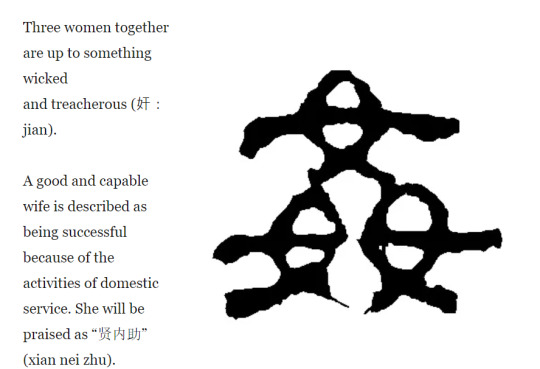
everything containing “ 女 “ (female) in chinese character etymology means something negative, cunning, devious, dark, or to indicate a servant. studying and knowing all those characters sickens me to the core. confuscianism furthered this in east asia weakening women’s rights - before confuscianism, korean dynasties had female kings and some property rights.
though we often use different chinese characters in each cases, china - korea - japan
screenshots source
the origin of the “female” character is a woman kneeling
in other explanations in confuscian texts, it says it is an image of a person kneeling with their neck in a pillory
on the contrary, the letters for “man” 男 is a person with the power 力 to feed 10 十 (shi) 口 (gou) mouths= family
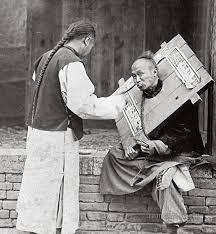

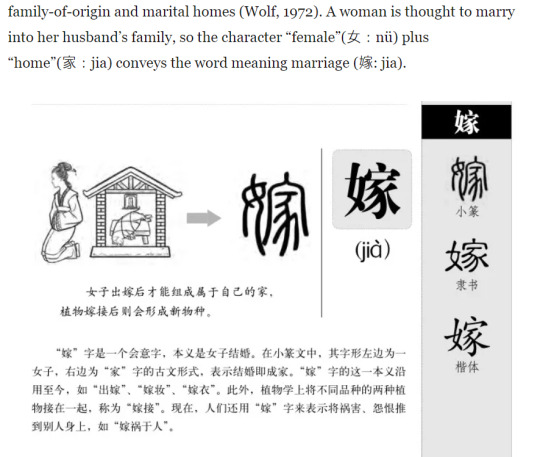
Wife as housemaid
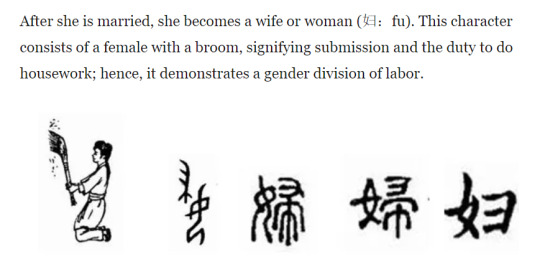
a woman outside a home(under her husband) is not safe
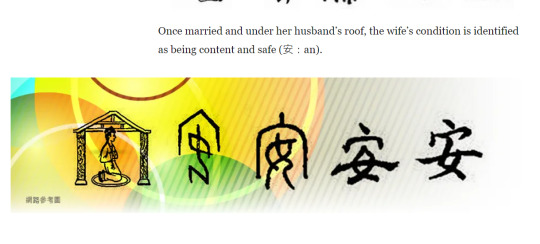
women with other women are always plotting
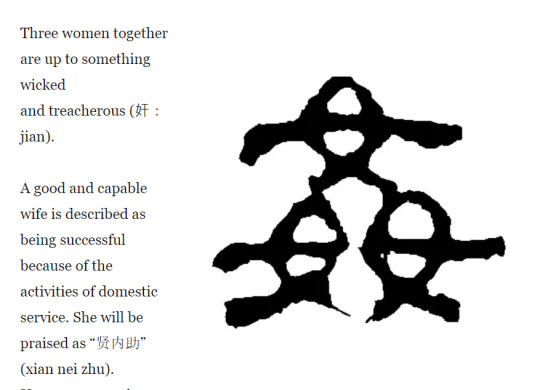
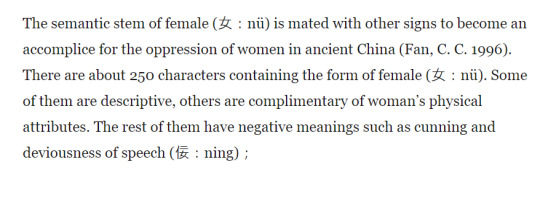
a man is allowed to have multiple wives, especially if she does not bear children: but he does not generally need justification. a women should never be jealous, jealousy (contains chinese character for female) is one of the 7 sins that husbands could banish, or beat their wives for
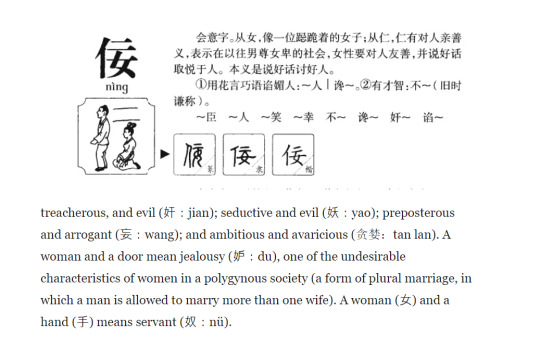
women + hands = servant
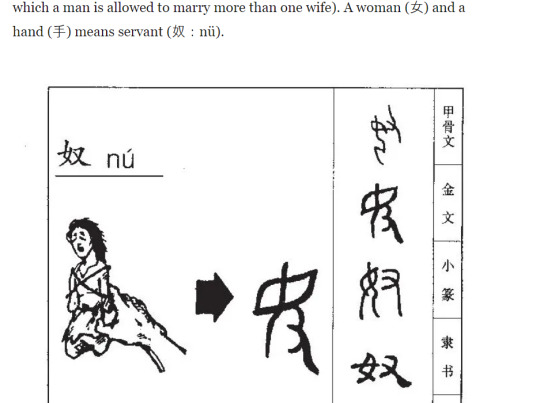
add fire onto the mix of the same characters of “servant”, you got “anger”
a lot of negative emotions in chinese characters are associated with symbols of women
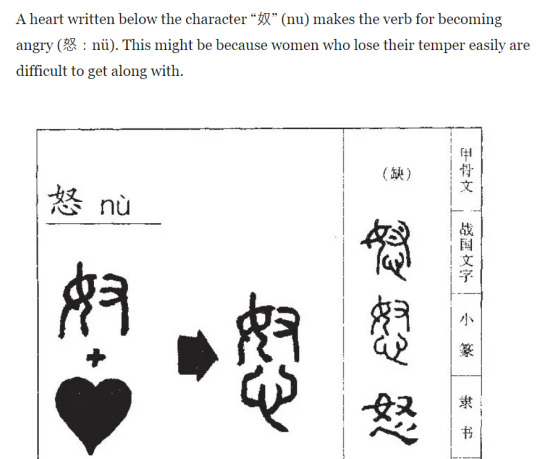
“Power” : women subjugated under a weapon

fraught mentions of female inferiority
남존여비 is a word often brought up in korean culture, as in males are precious and respectable “ 尊 ” and females are inferior by birth “ 卑 “ . Men are high, women are low. Gentlemen comes first
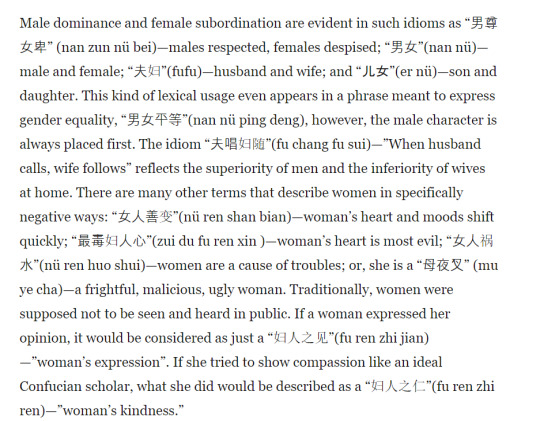
https://bild-lida.ca/educationalsociolinguistics/uncategorized/womens-oppression-and-chinese-characters/
嫌 for extreme “hate” = women
adultery = dark cunning thing that women do
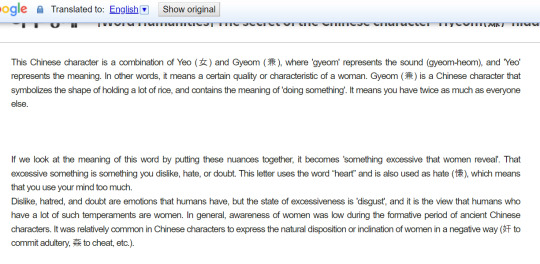
not all chinese characters with “women” have bad meanings! Some have positive meanings soch as detailing women’s looks or her docility
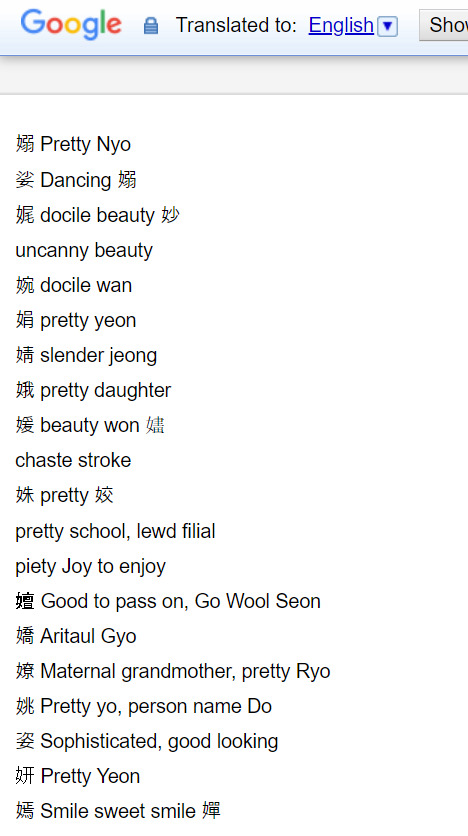
there are few if not zero chinese characters with the male “ 男 “ used inside a character contrary to the female “ 女 “ as a descriptor.
#i wanted to put chinese idioms here but guess that some idioms are same in every country#theres the exact same word for word ancient saying in chinese#korean italian and russian#you should beat women once in a while to subdue them#if women get power the world crumbles#etc#the tidbit about hens crowing bringing the house down#(cuz roosters aka men should rule not women=hens/cats#are the same in scottish proverbs?#Asian languages on the other hand? Uh good luck understanding a single word...#misogyny#mine
289 notes
·
View notes
Text
Reading online and watching videos I've been noticing a pattern in the recent Italian slang: using "in culo" as an adverb to mean "molto, veramente, tanto" (=really, a lot, very much) or, to keep the swearing level "fottutamente" (=damn, dang, hell, fucking, freaking)
So for example if something you're eating is really good, you can say "è buono in culo" = it's freaking good
If someone is being an asshole with you or purposely misinterpreting you, you can say "sei scemo in culo" = you're fucking stupid
#it#italian#langblr#italiano#italian language#italian langblr#languages#parole words#italian slang#slang#tw swearing#idiomatic sentence#idioms#italian idioms#lingua italiana#italian swearing words#tw food#tw swear words
100 notes
·
View notes
Text
funny idioms
My personal selection of idioms collected here and there. my posts - resources masterpost | aesthetic idioms | words with cute literal meaning
Icelandic 🇮🇸
Ég borga bara með reiðufé 🐑💰 - I only pay with an angry sheep: Okay, but I don't have to like it
að taka einhvern í bakaríið 🥯 - to take someone to the bakery: used as a threat, often in sports, when your adversary is about to experience a heavy defeat.
Finnish 🇫🇮 @finnish-sayings
kissanristiäiset 🐱 - a cat’s christening: an unimportant event or holiday
nakki ja muusi 🍲 - in the year sausage and mashed potatoes: long ago
Ilma on kuin linnunmaitoa 🥛🐦- The weather is like bird’s milk: The weather is wonderful.
Hänella ei ole kaikki muumit laksossa - he/she doesn’t have all the moomins in the valley: they’re crazy
Norwegian 🇳🇴 @hazel3017
Nappe seg i løken 🧅 - Yank the onion: a man who masturbates
Høy på pæra 🍐- High on pears: someone who is arrogant (head gets so big it looks like a pear)
Det er helt Texas! : That’s completely Texas! That’s crazy!
Swedish 🇸🇪( @escapenorth-blog )
Den är paj �� - It’s pie. “It doesn’t work.”
du är ute och cyklar! 🚲 - you’re out and riding your bike! “You don’t know what you’re talking about!”
Fårskalle 🐑 💀 - sheep skull ; hissen går inte gela vägen upp- the elevator doesn’t go all the way up: stupid
släng dig i väggen - throw yourself against a wall: take a hike 🌲
Danish 🇩🇰 @vikinglanguage
der er kommunister i lysthuset*- communists are in the funhouse: when someone has their period 🩸🏠
skide grønne grise �� 💩 - to shit green pigs: be extremely frightened 😰
gåsevin 🍷🦆– goose wine: Water
pølsetysker 🌭 🇩🇪 – sausage german: a very German German or just a way to call Germans you dislike
ikke helt appelsinfri* 🍊 - not entirely orange-free: drunk 🤠
at tale flydende svensk* 🗣🇸🇪 - to speak Swedish fluently / tale i den store hvide telefon**☎️- talk in the big white telefon / ringe til Ulrik** 📞 : to call Ulrik: to throw up 🤮
at skyde papegøjen 🦜🔫- to shoot the parrot: to have luck
Dutch 🇳🇱
Helaas Pindakaas 🥜 - too bad peanut butter (“peanut cheese”): too bad, which rhymes with pindakaas = 🇩🇪 Schade Marmelade: same as Dutch, but with jam
German 🇩🇪 this post by @for-the-love-of-wolves-studies and this @moami
einen Clown zum Frühstück essen/frühstücken 🤡 🍽️- eating a clown for breakfast: not behaving decently/having bad humor
bekannt wie ein bunter Hund 🐶 🌈 - known as a colorful dog: someone known all over town
fuchsteufelswild 🦊 - fox devil wild: super mad
einen Vogel haben 🐦 - to have a bird: to be crazy
Ich glaub mein Schwein pfeift 🐷 - I think my pig whistles: I think I’m dreaming
die Gurkentruppe 🥒 - cucumber brigade: bunch of bunglers
Durch den Kakao ziehen 🍫- throw someone into chocolate: to make fun of somebody or something, to roast someone
die beleidigte Leberwurst spielen 🌭 - to play the offended liver sausage: being very resentful
Hans Wurst 🌭 - Hans Sausage: name to call a stupid person (both m/f)
jetzt haben wir den Salat 🥗 - now we have the salad: look at this disaster that we now have
jemanden hinwünschen, wo der Pfeffer wächst 🧂 - wish somebody would be where pepper grows: to want somebody to be as far away as possible
nah am Wasser gebaut 💧- built close to the water: someone that is easily moved to tears
italian 🇮🇹
Cascare dal pero 🍐 🌳 - fall from the pear tree - find out about something when you were supposed to know it
Far venire il latte alle ginocchia 🥛- make milk come from one’s knees: being a pain/ annoying,
Andare a rane** 🐸 - go (as) frogs: something like online connection is lagging
fare la figura del cioccolataio 🍫 - make a chocolatier’s impression: to make a fool of yourself, be responsible for embarrassing cockups
Che pizza! 🍕 - What a pizza!: “Nuts!”/ used Wien you are bored or annoyed at something
Essere alla frutta 🍎 🍌 - to be at [the moment of] fruit: when the situation is very bad (meals usually end with eating fruit), to emphasize this some people might say al caffè, al dolce ☕️ 🍰(coffee, dessert time)
Un limone 🍋- a lemon: a make out session
French 🇫🇷 this
Chanter en yaourt - sing in yogurt: singing in gibberish, random sounds pretending to sing in [English]
Poser un lapin 🐇 - to put a rabbit: To stand someone up
Avoir le cafard 🪳 - to have the cockroach: To be depressed
Tomber dans les pommes 🍎🍏 - To fall in the apples: To faint
Donner sa langue au chat 👅 🐈- to give one’s tongue to the cat: I have no idea/I give up. used to say you don’t know about something and are unable to give an answer.
Polish 🇵🇱 @pol-ski this post
można z konie kraść 🐎- you can steal horses with him: a trustworthy person
co ma piernik do wiatracka - what does gingerbread have to do with a windmill: it’s irrelevant
*: apparently not used much but wanted to include them cause they’re hilarious; **: maybe regional/use limited to an area
Thanks for contributions: @dasloddl (de), @tetsunabouquet (nl)
#idioms#funny idioms#food idioms#langblr#language blog#foreign languages#danish#Italian#German#Norwegian#Icelandic#finnish#mine#my lists#most are either animal or food
212 notes
·
View notes
Text
I really wanted to learn Italian but how am I supposed to deal with their verb conjugation omg I'm barely understanding plurals and prepositions. I'LL GO CRAAAZY
Every time I look at some new exercise I'm like:

83 notes
·
View notes
Text
wildest italian idioms compilation
compiled the weirdest idioms just for u <3 they are super common in italian but sound weird as hell in english. use them with frequency, put them in your fics, idk :)
"toccarsi le palle"="touching nuts", it's the equivalent of "knock on wood": you use it do avert bad luck
"a cazzo di cane"="like dog's dick", you use it in the phrase "doing something..." and it means that thing was done badly
"avere culo"="to have ass", to be lucky
"stare sul culo"="to be on someone's ass", it's used to say you don't like someone/you find them a jerk
"prendere l'inculata"="to take it in the ass", when something goes bad for you. es:"they didn't tell me i had to study that part and it was in the test, i took it in the ass"
"in culo ai lupi"="in the wolves ass", said of place that is difficult to reach/somewhere really far
"sfigato"="without pussy", tecnically it mean you don't have a girlfriend, but nowadays it is only used with the meaning "unlucky"
"sei un dito in culo"="you're a finger up the ass", you're unpleasant. you can add things on this, i had a friend who used to say "you're three fingers full of sand up the ass" and i think that's beautiful
"ne ho le palle piene/i coglioni pieni"="i have my balls full", means that you're annoyed by a situation/someone and you can't take anymore of it
#these are just a small part of our weird idioms#:)))#so next time bez says something out of pocket you know what it means :)#italian
14 notes
·
View notes
Text
A reaction to TV Tropes’ “Dead Unicorn Tropes”
TV Tropes and Idioms is a great site, and a bad website.
For dissecting fiction, identifying tropes, throwing little tidbits of cool info and fun trivia, it is a great site.
For actually teaching people real things about the world, or when it comes to its generalizations of genres and styles... it can be very bad.
I have this love-dislike relationship (not hate though) with TV Tropes because this site was so useful for me so many times I can’t imagine not living without it ; BUT I also noticed so much wrong things posted or written in pages because TV Tropes is not kept by actual experts and anyone can actually write anything in there - hopefully people double-check and hold the website together, but a lot of false, incomplete or biased information just slips by as it lacks Wikipedia’s stern neutral position.
And as I was scrolling through the pages I found the “Dead Unicorn Tropes” page. A page listing tropes that are basically “dead horse tropes” (that is to say over-used, over-parodied, over-played with, over-referenced tropes to the point they are seen as painfully cliche, greatly unfunny or dreadfully doll and boring owadays) - but with the twist that they are “unicorns”. Aka... while everyone treat these tropes as ancient, worn-out, over-used cliches, they never actually existed as “tropes” in the first place. They never were as popular and widespread as people believed - it is basically the Mandela Effect, but for popular culture.
For example many people think that James Bond wears a tuxedo all the time - when in truth he always just wore tuxedos for a few crucial scenes. But given they were among the most iconic and well-known scenes, popular culture developped the belief that James Bond was ALWAYS in a tuxedo. Or a lot of people parody romance animes by having the main protagonist running late for school with a toast in their mouth only to bump into someone... despite this scenario never being widespread or really used in the first place in animes of this genre.
Anyway... What caught my eye was a specific section of this page. A section dedicated to fairytales. And this being a fairytale blog... let’s react!
Fairy tales' supposed idealism and inevitable happy endings are commonly mocked and "deconstructed", most people being unaware that the real stories were often violent, cynical, and depressing. It's something of a Cyclic Trope, since the original stories had such a grim tone, before being bowdlerized and Disneyfied because Children Are Innocent (which is in itself an example of this trope), causing the stories to end up in an Animation Age Ghetto, which left them filled with Fridge Logic and other ripe fodder for deconstruction. On the other end of the spectrum, the belief that all fairy tales were originally gory grimdark horror stories before their Disneyfication is similarly exaggerated; the most common gratuitously violent passages that modern adaptations tend to leave out involve the deaths of the villains at the story's end. Grimmification as a trope is a rather ironic appellation, as The Brothers Grimm were in fact the Ur-Example of Disneyfication, with many of their stories being even darker before the Grimms retold them (but still not the nightmare gorefest people like to think).
I don’t have much to add to this section. The complicated thing with TV Tropes is that it mixes all fairytales together, not separating their origins, genres, cultural context - but what you can be sure about is that when they generalize “fairytales”, they actually talk of the “Western fairytales”, the specific chain of fairytales that went Italian-French-German.
It is true that the original Italian fairytales (well... they weren’t fairytales because the term fairytale was invented by the French, but these were proto-fairytales) were filled with sex, violence and grotesque elements - but that was because they were farcical humoristic stories, part of a long tradition of surreal bawdy slapstick tales inherited from medieval times, and they were entirely destined to adults.
The French fairytales were a “Disneyification” as TV Tropes says : because they became courtly tales told by nobles, aristocrats and intellectuals - it was the introduction of traditional fairytale princesses, of virtues and beauty winning over vice and ugliness, of delicate dialogues and scenes out of pastoral romances, etc... Perrault was the one who removed from Little Red Riding Hood the most gruesome details (such as how the wolf, according to some versions, leaves a bit of the blood and flesh of the grandmother for Little Red to eat). BUT on the flipside, French fairytales were FAR away from being Disney fairytales. They were “dark” as while they removed obvious sexuality they kept all the violence, from Bluebeard killing his wives in a chamber of blood to ogres eating their own children while being drunk one night. And while happy endings were very common, they weren’t a standard of fairytales: Charles Perrault’s Little Red Riding Hood ends with the girl being eaten by the Wolf, and that’s it - because it is a warning tale ; while Madame d’Aulnoy’s The Yellow Dwarf ends with the two lovers dying and becoming a couple of trees - due to the story being inspired by ancient myths.
As for the German fairytales, the work of the Brothers Grimm... On one side they do seem “darker” than the French fairytales due to trying to imitate/stay more faithful to the original folktales, and thus they include much less refinment, much less clear virtues and vices, much more bizarre, disturbing or murky elements... But nothing is too simple, as the Brothers Grimm also HEAVILY “Disneyified” fairytales - they cut down many tales from their book they deemed too “immoral” ; they added many happy endings (they invented the Woodsman saving Little Red Riding Hood) and they changed many dark elements (Snow-White’s stepmother was originally the girl’s mother).
Overall it is impossible to pin-point a specific “culprit” for making fairytales “lighter” or “darker” because each new incarnation of them has its own part of darkness and lightness... But TV Tropes might also evoke “fairytales” as in “literary fairytales VS folkloric fairytales” - opposing the fairytales written down by authors who actually tried to create a work of literature (all the fairytales talked about above are part of this category) to the actual “fairytales” told by common people, part of folklore and which inspired the literary fairytales. That is another often overlooked simplification: the fairytales we know are all literary works - inspired by folktales yes, but the same way you can have television shows, movies or podcasts inspired by folktales. And under this angle - yes, definitively, all the literary works put a “lighter” twist on the original tales of the common folk.
True Love's Kiss is not an original element to most fairy tales, but is rather a Disneyfication element. Many fairy tales' protagonists did indeed have The Big Damn Kiss, but it's not meant to be something especially powerful or magical, like a Deus ex Machina. Taking a survey of the most popular such kisses: in the Grimms' version of "Sleeping Beauty", the prince does awake the title character with a kiss, but that's just coincidence because he happened to be there when her hundred-year curse expired;note and in "Snow White", the prince never kisses Snow White, but instead drops her coffin and dislodged the chunk of poisoned apple stuck in her throat. The Ur-Example of the trope was in Norse Mythology, of the Valkyrie Brunhilda who was punished by Odin to sleep on a couch surrounded by fire and was awakened with a kiss from the hero Siegfried.
True! Well, almost... “true love kiss” was present in some French fairytales (as part of the “courtly love” angle - later taken back by the Grimms who wanted to make some tales “cleaner”), and fairytales do have magical kisses of various kinds, but 1) the term “true love kiss” was invented by Disney for its Snow-White movie and 2) the concept of a magical kiss has been taken out of proportions in fairytales. As the text points out: no versions of Snow-White, from the Grimms or from others, have the princess being woken up with a kiss - it was a Disney invention. But given Disney’s two most prominent and famous fairy-tale adaptations (Snow-White and Sleeping Beauty) used the “true love kiss” resolution, people learning of fairytales through Disney thought it was a traditional ending - and Disney’s capitalizing on it did ot help.
I will also add that while the Grimms’ use of the “magical love kiss” might have been influenced by the Germanic myth of Siegfried (after all the Grimms heavily studied and reconstructed Germanic mythology) ; the “magical love kiss” of French fairytales was obviously taken rather from Greco-Roman sources, more precisely from the tale of “Psyche and Cupid”, THE first proto-fairytale.
The Knight in Shining Armor rescuing the Damsel in Distress from a dragon is commonly associated with fairy tales, but this is rather rare; The Brothers Grimm only used it twice.
Kind-of-true too. Dragons are NOT typical or traditional fairytale villains - except maybe in folktales and rural legends. Similarly, male heroes in fairytales are rarely knights - they are mostly princes/nobles or peasants of some sort - sometimes a soldier, but that’s all. In fact, beyond the rare Brothers Grimm example cited above, the only other manifestations of this scenario appear in French fairytales, which loved to have a noble male hero save a damsel from some sort of monster - but dragons weren’t more popular than giants or wicked sorcerers, and the male hero rarely was a “knight” and rather a warrior-prince or fighting king.
The Unicorn (natch) is even more rare. If you do catch one, it won't be the delicate and pure creature like the modern trope, but the fierce and dangerous version of actual medieval legend.
True, because unicorns do not belong to the world of fairytales, but to the world of legends! I never saw one “original” fairytale, literary or otherwise, using a unicorn. Unicorns were part of medieval bestiaries and legends, and as thus were then reused in works of the “fantasy” genre in modern days - and then fantasy “bled” and got a bit confused with fairytales, and unicorns hoped into the “modern fairytale” conception... But yeah, unicorns in fairytales are basically completely unseen.
The Fairy Godmother is extremely rare and appears to have been introduced from literary variants. Sleeping Beauty is often just the victim of a prophesied fate. Cinderella is generally helped by her dead mother in some way, or by some magical beings whose good will she's earned. Even when she appears, it's not that "fairy godmother" is a type of supernatural being akin to a "guardian angel", but rather that a character's godmother, someone everyone in medieval Christendom would have and would already know as a close family friend, is unexpectedly revealed to be a fairy in disguise.
Ah... “Literary variants”. Now that’s a very interesting thing. You know, for a very long time the critics, the teachers, the ones studying fairytales, had this approach: look for folklore, rural legends, the “folktales” first, then look at the literary fairytales later and compare the two, seeing literary fairytales as “reimaginations” of the “original” tales. Nowaday, people in universities, and experts of literature, and critics, recognize that this approach is false and outdated - thanks to the research proving that most of the “folktales” we claim were the “original” sources... actually are just rural twins or doubles of the literary fairytales, which became so popular they spread to the lower classes. And fairytale history nowadays begins with the literary fairytales first - heck, the very term “fairy tale” was invented to designate the literary tales. Fairytales was originally a literary genre - and the term was only later broadened to include “folktales” in it (resulting in many mythological legends or religious tales being often incoherently called “fairytales”).
That being said... “The Fairy Godmother is very rare”. Oh boy... you feel whoever wrote this only knows of German fairytales, aka the Grimms’ work. Fairy godmothers are EVERYWHERE in the French fairytales. Why do you think the genre was called “fairy tale”? BECAUSE THERE WERE FRIGGIN FAIRIES EVERYWHERE!!! What’s even funnier is that the whole idea of “The Fairy Godmother protects the heroine” was invented by Grimms and Disney. A lot of fairytales in Madame d’Aulnoy’s books are actually persecuted by the fairy godmothers of the story’s villains, or of their rivals! Sometimes you even have battles of fairy godmothers!
Fairies themselves. Almost any conversation involving them will bring up that in the original tales fairies weren't good or helpful but were supposedly all represented by the most sinister interpretations of The Fair Folk. In reality fairies in the old tales and mythology tend to run the whole gamut from being good and/or helpful to being downright vicious. In many tales the behaviour of the same fairy type or fairy character can vary wildly depending on how a human interacts with them (usually courteous and virtuous behaviour will be rewarded, while vanity and other character flaws will be punished)
On top of what I said above, the article of TV Tropes here also keeps practicing a big confusion between several types of fairytales.
Fairies are actually pretty much absent from the fairytales of the Brother Grimms, who rather leave place for either magical dwarfs and imps, either witches, and sometimes supernatural ladies such as Frau Höle. The fairies REALLY come from the French fairytales - again, I have to insist, the very term “fairy tale” (conte de fées) was invented to talk about the works of Perrault and d’Aulnoy. And fairies in French fairytales were far from the “all good, kind and cute” fairies - again, this is Disney’s work (and actually it is also the work of Victorian literature, but that’s another subject). In French fairytales you have both good fairies and wicked fairies - though most of the time they are clearly divided by a manicheism of “good, kind, beautiful, benevolent fairies” VS “ugly, monstrous, old evil fairy”. However, some fairytales (such as those of Aulnoy) still blurred the line between the two as good fairies could be easily offended and thus do wicked things.
But here TV Tropes again refers mostly to “folktales” VS “literary tales” - and of course in “folktales” fairies are wildly different from their literary counterpart... Though even there is yet again another layer of confusion (so many...), because the French “fées” are NOT the English “fairies” even though they do translate by the same word. In English “fairies” originally designates a lot of inhabitants of the Otherworld ranging from pixies to monsters: in French “une fée” is originally a supernatural lady of the Otherworld, a cross between a goddess and a druidess/priestess, halfway between a nymph and sorceress.
#fairytales#fairy tales#french fairytales#german fairytales#charles perrault#brothers grimm#tv tropes and idioms#reaction post#madame d'aulnoy#fairy godmother#fairy godmothers#italian fairytales#true love kiss
29 notes
·
View notes
Text
Lang-8.com alternative: Discover 65words.com
👋 Hey Amigos, it’s zakokor. I’m the solo developer of 65words.com, a challenge for writing 65+ words daily in the language you’re learning.
Recently, I stumbled upon Lang-8.com, a platform that has been serving language learners since 2007, recently announced the termination of its services by the end of February 2024. This news may leave many language enthusiasts searching for a new and effective way to continue their language learning journey.
I, personally, have never participated in Lang-8, but I believe that 65 Words can provide a welcoming space for language enthusiasts to continue their daily writing practice.
So, why choose 65words.com?
65 Words is a challenge for writing 65+ words daily in the language you’re learning and, it's simple: No sign-ups, no passwords to remember. Just browse 65words.com and start to write. ✍️
Next, you'll need to complete 65 words or more to be able to send your writing, and it's one writing per day, no more.
Why 65 words? Well, I've noticed that it's the perfect formula for you to achieve it every day. It doesn't require much time, and you can do it anytime, anywhere. In return, you'll benefit from being exposed to the language every day.
I think writing daily is a great exercise to keep your language skills on point, learn new vocab, and truly think in the language you're learning.
Regarding feedback, yep, we've got feedback too. But here's the real deal – when I cooked up 65words.com, my goal was to create a space where you can write fearlessly. Feedback is cool, but the main gig is embracing the language without the fear of making mistakes. Let's keep it real.
And you can be a superhero 🦸♂️🦸♀️ — I mean, you can share your writings anonymously, you can express yourself and make mistakes without fear, as all usernames are superhero-themed.
I hope you enjoy it! Visit 65words.com to start your daily 65+ words challenge.
Best, zakokor 🌟
#learnenglish#learnlanguages#idioms#writing#learn spanish#learn italian#learning swedish#learning languages#learn french#learn german
2 notes
·
View notes
Text
la dolce vita is an expression used to describe a life full of beauty, pleasures, and mundane events
—ThinkItalian.com
https://www.thinkinitalian.com/la-dolce-vita-meaning/
#la dolce vita#the sweet life#rome#italy#travel#italian#italian language#phrases#idioms#mantra#meditation#mundane#beauty in the mundane#depression recovery#cptsd recovery
2 notes
·
View notes
Text

//I do have one thing you won't EVER see me do whenever I write my historical muses: Have them speak the Queen's English no matter what language they're actually speaking.
#IT ANNOYS THE FUCK OUT OF ME#I could not STAND watching Cappn play Assassin's Creed: Unity in English#because the French people are using English idioms and slang and different accents from ENGLAND#including Cockney and West Country#REALLY UBISOFT?#yes the attempts at Italian were not perfect in the Ezio games and sometimes real cringey#but the fact you pronounced 'Giovanni' correctly showed YOU DID YOUR HOMEWORK AT LEAST#I am not asking for perfect accents in every region in history#I can't even do a good Tagalog or Californian accent#But then I watch 'Ever After' and 'The Man in the Iron Mask' and I'm just AAAAAAAAAAAAAAAAAAAAAAAAAA#STOP THAT#STOP THAT STOP THAT STOP THAT#STOP CONVEYING HISTORICAL PERIODS WITH MODERN BRITISH ACCENTS AND SLANG#IT DOES NOT CONVEY 'history' IT TAKES ME OUT OF THE IMMERSION OF THE SETTING#rant over lmao#[OOC]
4 notes
·
View notes
Text
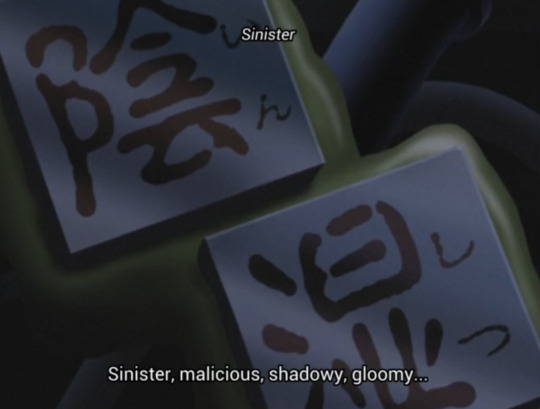
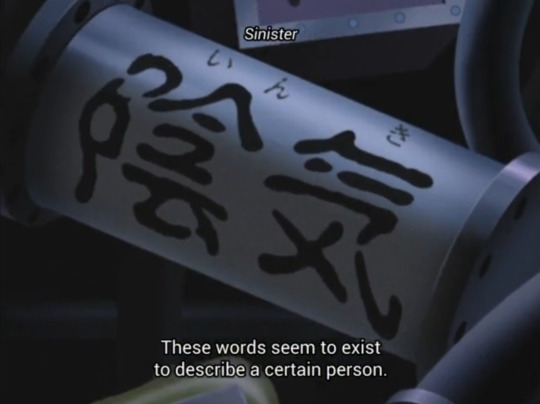
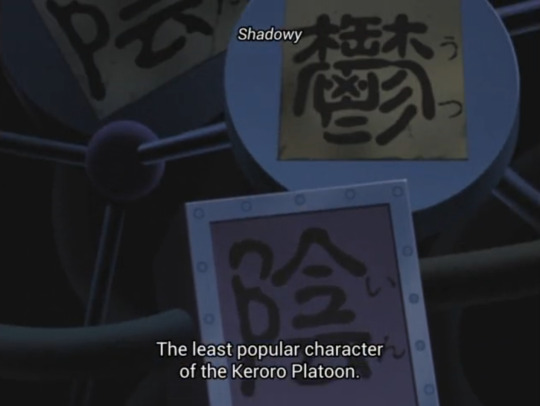
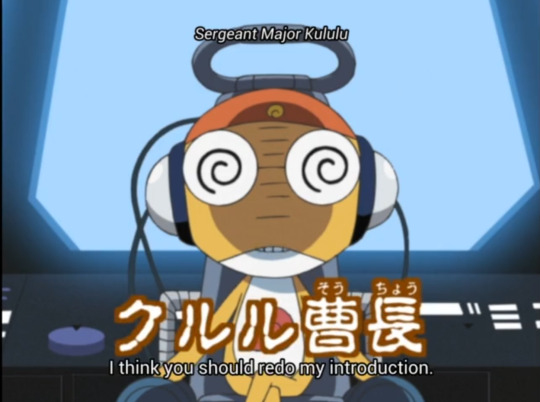
"SINISTER... malignant... devious and mistrustful. These words seem invented appositely to describe the character of the keroro platoon that EVERYONE detests." [...]
"I'd advise you to take back what you said and use other terms to introduce me."
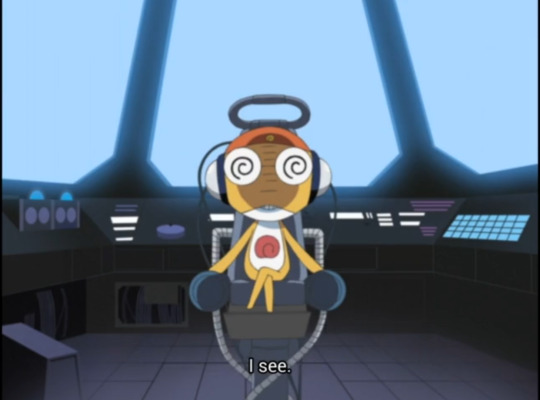
"Then it's fine."
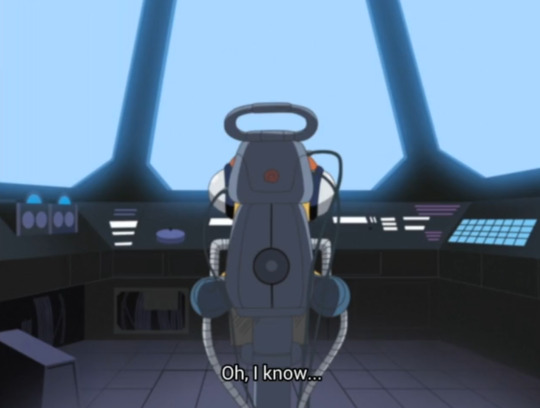
"I may accept that then."

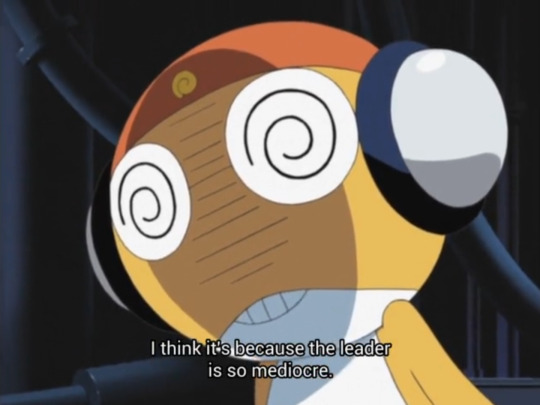
"Lately I feel like the platoon is lacking something. Nothing exciting happens. Of course, that's the fault of that spineless leader we're stuck with."
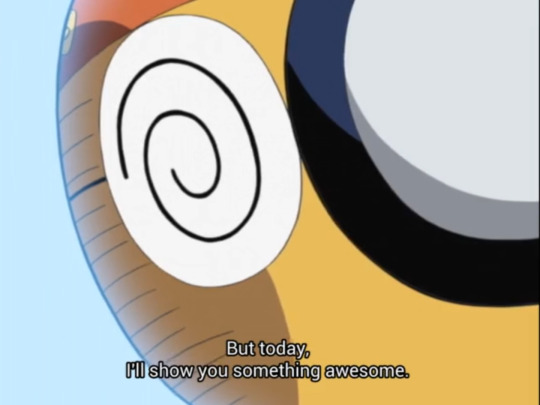

"That's why I've decided to add a pinch of creativity to our adventures. Stay tuned."
#ita dub#kururu#there goes ita kururu again with his musings about CREATIVITY... hes crazy#hes also ruthless damn he said keroro is spineless. a weakling. no backbone however u wanna say it#the lore implication of being ''stuck'' with keroro is huge but i will forgive it for its inaccuracy#mostly because it's more of an idiom in italian. sorta like. look who we have to deal with here#like u say u are Stuck with someone if they're being a nuisance to u. not that u are Literally stuck with them#hes INSANE this episode was INSANE im going to murder him#ep 28b
5 notes
·
View notes
Text
God gives his spiciest meatballs to his zestiest of chefs
4 notes
·
View notes
Text
One time I was with my uni colleagues and I was talking about my sister's wedding and I said "è che per le bomboniere non vogliono fare il solito pisciaturo" and everyone started laughing then one said "tu non parli mai in dialetto ma ogni tanto fai certe uscite che fanno morire" and i haven't stopped thinking about that since then. It's been 4 years.
#It's just that i hate my milanese accent so when people tell me i am different they can feel I'm not completely from here#my heart goes 🥰🥰🥰🥰😍😍😍😍❤️❤️❤️❤️#i notice this when i talk to my therapist too like sometimes I need certain idioms and things that are... not italian#i stopped saying 'furia' for 'tanto' tho. maybe i should start again just to mess with people#bc it's a ascolano thing lmao
4 notes
·
View notes
Text
The English saying "Only the brave(s)" is often compared with (and translated as) the Italian "Succede solo a chi ci crede".
Here you have the literal translations:
Only the brave(s) = Solo il coraggioso/colui che ha coraggio (Solo i coraggiosi)
It happens only to those who believe in it = Succede solo a chi ci crede
The general acception is the same (i.e. to fully believe you need to be brave), that's why we tend to use them equally.
[In Italian "Solo i coraggiosi" doesn't make much sense per se tbh, unless we openly refer to the English's translation ofc.]
#english#it#italian#langblr#italiano#italian language#italian langblr#language#languages#parole words#traduzioni#sayings#modi di dire#idioms#idiomatic sentences
52 notes
·
View notes
Text
Aesthetic/cute idioms
My personal selection of idioms collected here and there. Inspired by this post by @rmscarpathia - my posts - resources masterpost | aesthetic idioms | words with cute literal meaning
Japanese 🇯🇵
木漏れ日 Komorebi - The sunlight that filters through the leaves of the trees. 🌳 🌞
鏡花水月 Kyōka suigetsu - Flower in the mirror & a moon in the water 🌸 🌙 : something which is visible and cannot be touched as well as the profound beauty of poems that cannot be described in words.
花笑み Hanaemi - flowering smile/ the smile of flowers 💐: old Japanese, a smile as beautiful as blooming flowers, calling people to feel happy.
浮世 Ukiyo - The floating world - depicts a place of fleeting beauty and living in the moment, without worries. It described the urban lifestyle, especially the pleasure-seeking aspects, of the Edo-period Japan (1600–1867)
Chinese 🇨🇳
海誓山盟 Hǎi shì shān méng - The promises of mountains and vows of seas 🏔 🌊 : A proverb of eternal love.
日三 秋 yí rì sān qiū 🍁🍁🍁- One day, three autumns: when you intensely long for and miss someone, one day feels like three years.
Swedish 🇸🇪
Mångata - moon road 🌙 🛣The glimmering,roadlile reflection of moonlight on a river. see also Hungarian 🇭🇺 Aranyhíd - The golden bridge 🌞 🌁: A term for the reflection of the sun as it shines on water and can literally be translated to.
Gökotta - Dawn picnic to hear the first birdsong 🎶 (gök=cuckoo), Swedish tradition which often takes place around Ascension Day in late May or early June.
Smultronstället - Place of wild strawberries 🍓: a special place discovered, treasured, returned to for solace and relaxation; a personal idyll free from stress or sadness
Mellan hägg och syrén - the time Between Bird Cherry and Lilac: corresponds to försommar (pre-summer). The expression is said to originate from a cobbler’s sign saying his shop was closed “mellan hägg och syren”.
Att vara blåögd - to be blue eyed: to be naive =🇩🇪 blauäugig
Norwegian 🇳🇴
Å leve på luft og kjærlighed - live on air and love: to be so madly in love you don’t think about anything else
gjensynsglede - see-again-happiness: feeling of joy, anticipation, love you experience when you are about to meet someone you haven’t seen in a long time.
Det er bare blåbær - It’s just blueberries 🫐: Expression, meaning something is simple, or something is only a minor issue.
Danish 🇩🇰
det er fest og farver 🎉🟥🟨🟦- it’s party and colors: A lively and festive mood or way of living
Finnish 🇫🇮 @suomipaskea @depressingfinland
Kaiho - hopeless longing: an involuntary solitude in which one feels incomleteness and yearns for something unattainable or extremely difficult and tedious to attain.
luonnonlapsi - nature’s child 🌿: a genuine and sincere person who’s carefree and down to earth, a scatterbrained, someone who doesn’t care about the ways of society. Slightly negative but in an endearing way [- @evelhak]
siirtyä ajasta ikuisuuteen/iäisyyteen / potkaista tyhjää- went from time to eternity / kicked the emptiness: said about someone who has died
Olla hyvällä tuulella— To be on / To have a good wind 🌬: To have a good mood. To be mildly happy.
oma maa mansikka, muu maa mustikka 🍓🫐-our land strawberry, other land blueberry: there’s no place like home
German 🇩🇪 This post with additions of @germanenthusiast
Etwas durch die Blume sagen 🗣️🌼- to say smth thorugh the flower: used when conveying something dramatic in a gentle or roundabout way
Habseligkeiten: have-holy-things: individual possessions that might be seen as useless/of little value, but regarded as valuable treasures
Fingerspitzengefühl - fingertips-feeling: good skill in handling things/ sensitivity and empathy
Sehnsucht - longing-search: intense inner longing for somebody, something or a place
Weltschmerz - world pain: gratuitous melancholia / kind of feeling experienced by someone who believes that physical reality can never satisfy the demands of the mind / the feeling of anxiety caused by the ills of the world
Zeitgeist - spirit of the time: the dominant set of ideals and beliefs that motivate the actions of the members of a society in a particular period in time
Engelsgeduld 👼- angel’s patience: a lot of patience
Schokoladenseite - chocolate side 🍫: refers to your better side (e.g. when taking a photo) sich von seiner Schokoladenseite zeigen (to show oneself from one’s chocolate side) = to show oneself at one’s best
Sich aufbrezeln - to bretzel oneself up 🥨: get all dressed up
Friede, Freude, Eierkuchen - freedom, joy and omelette 🥞: everything’s hunky-dory
sich freuen wie ein Schneekönig 🤴❄️ /Honigkuchenpferd 🍯🍰 🐴 - to be happy like a snow king/honey cake horse: to be very very happy
Dutch 🇳🇱 @docnederlands
uitwaaien 🌬️ 🌳 - to go out in windy weather, particularly into nature or a park, as a means of refreshing oneself and clearing one's mind
over koetjes en kalfjes praten - talking about cows and calves 🐄: smalltalk
kalverliefde - calf love 🐮: A word for the temporary affection and infatuation usually experienced by two young people in love.
De bloemetjes buiten zetten, to put the flowers outside 💐: to have lots of fun
Italian 🇮🇹 this by @sectioavrea
Se son rose fioriranno, If it’s roses, they will bloom 🌹 : if something is bound to happen, it will
all’acqua di rose - blanded with rose water: used when something is very moderate
Non è tutto rose e fiori - it’s not all roses and flowers 🌹💐 : it’s not all nice and perfect (as you think it is)
il sole bacia i belli - The sun kisses the beautiful 🌞: said to someone who complains about sitting in the sun
baciato dalla fortuna - kissed by luck 🍀💋: to be very lucky
Ragazza acqua e sapone - soap&water girl 🧼 the girl next door, with a natural look
Avere l’argento vivo addosso - to have quicksilver on your body: to be energetic, active, lively. Often used for kids
Spaesato(m)/spaesata(f) -out of (one’s) country/native place “mis-country-ed”: to be bewildered, disoriented, confused
Sognare ad occhi aperti 👁️ - To dream with open eyes: to daydream
essere al settimo cielo ☁️ - to be at the seventh Heaven: to be over the moon, see 🇫🇷 below
French 🇫🇷
Être aux anges 👼👼- be where angels are
Être fleure bleue 🌼🔷- to be a blue flower: be sentimental to the point of naivety [apparently from an expression by the German author Novalis]
English
Serendipity: an unplanned fortunate discovery
Apple of my eye 🍎👁️ - 🇮🇹 Luce dei miei occhi (light of my eyes) 🇩🇪 Licht meines Lebens (light of my life)
Greek 🇬🇷
petrichor: the earthly scent produced when rain falls on dry soil 🌧️ . from πέτρος pétros (stone) + ἰχώρ īchṓr (the fluid that flows in the veins of gods in Greek mythology)
Phosphene - light-appear: a sensation of a ring, stars or spot of light caused by rubbing your eyes ⭐️ 👁️
🇻🇳 In Vietnamese, “to miss someone is the same as “to remember someone“. So to ask “do you miss me?” You’ll say Do you remember me?
🇮🇷 in Farsi, to answer to a compliment you say “it’s your eyes that are beautiful”
Idioms found among others through: @mylanguagesblogger, @wonderful-language-sounds @thenoaidi
🌼 started: spring ‘20, posted: march ‘23, last updated: 20.4.2023
#idioms#foreign languages#langblr#language blog#swedish#finnish#italian#dutch#norwegian#japanese#chinese#french#cant believe I am posting this#I feel like there’s still a lot to be added but it was high time for it to be posted#mine#my lists
80 notes
·
View notes
Note
Oh me?? Well, I’m not sure if it’s even all that comparable, since the people I know with magic abilities got them through deities, but I do know a couple. I don’t know the more famous ones as well personally, but I’m familiar with both the Sunsrage and the Tenebrae if you know who they are-- but my favorite one is Mr. Sevrin aka the Lamented. He’s basically my grampa you see.
Their magic is divine in nature though, so it’s like an external thing that they can call upon now and have to learn the uses of rather than something to learn how to access and use. Does that make sense??? Is there even much of a difference???
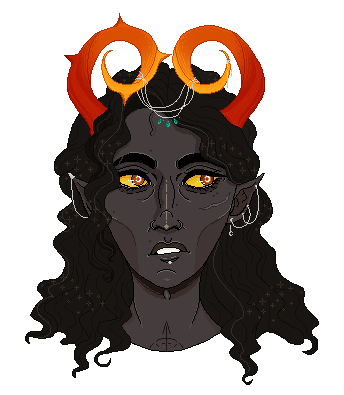
> Reshaper clicks his tongue and frowns, foot shaking at a slightly faster pace as if he was a bit irritated or uncomfortable with the topic at hand.
"I've heard the names on the wind you could say, can't say I'm mucha' fan of divine magic, for a variety of reasons. That stuff can really break a man's boxes, really dampens a mood."

"Sevrin though, I've heard that name for sure, although it's been quite some time... might've heard about him from Orfuse way back when I think? Hard to say, it's been a long time, Ocelle."
"Only heard good things! Admittedly I wasn't interested in learning more at the time, I had too much else to worry about. What sort of magic does he get up to, same divine nonsense as the other two?"
"I'd say that the biggest difference is having to trust and rely on something out of your control for your abilities would do it for the difference, but I suppose the harnessing of such could be somewhat comparable, sure."
#Reshaper speaks#ocelle#sunnetrolls#ty ty sunne make sure u take care of u#breaks a mans boxes is an italian idiom meaning gets on my nerves basically btw#hope y'all are okay with me just uh.. guessing? assuming??#i can change it if u guys want just lemme know :thumbs up emoji:
4 notes
·
View notes